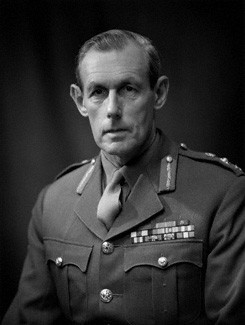
Field Marshal Richard Michael Power Carver, Baron Carver, was a senior British Army officer. Lord Carver served as the Chief of the General Staff (CGS), the professional head of the British Army, and then as the Chief of the Defence Staff (CDS), the professional head of the British Armed Forces. He served with distinction during the Second World War and organised the administration of British forces deployed in response to the Mau Mau Uprising in Kenya and later in his career provided advice to the British government on the response to the early stages of The Troubles in Northern Ireland.

Field Marshal Sir John Lyon Chapple, was a British Army officer who served as Chief of the General Staff (CGS), the professional head of the British Army, from 1988 to 1992. Early in his military career he saw action during the Malayan Emergency and again during the Indonesia–Malaysia confrontation and later in his career he provided advice to the British government during the Gulf War.
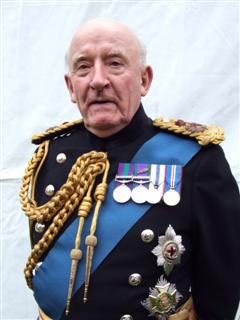
Field Marshal Peter Anthony Inge, Baron Inge, was a senior British Army officer. He was the Chief of the General Staff, the professional head of the British Army, from 1992 to 1994 and then served as Chief of the Defence Staff before retiring in 1997. Early in his military career he saw action during the Malayan Emergency and Operation Banner in Northern Ireland, and later in his career he provided advice to the British Government during the Bosnian War.
General Sir Roger Neil Wheeler, is a retired British Army officer who served as Chief of the General Staff from 1997 to 2000. During his career he was involved in the Cyprus Emergency, directed military operations in Northern Ireland and led the UK's forces deployed on NATO operations in Bosnia. He is now a non-executive director of several businesses operating on an international basis.

Field Marshal Michael John Dawson Walker, Baron Walker of Aldringham, is a retired British Army officer. Commissioned in 1966, he served in Cyprus, Northern Ireland, and in a variety of staff posts in the United Kingdom until 1984. After being given command of a battalion, he was mentioned in despatches for his service during a second tour of duty in Northern Ireland, this time in Derry, and subsequently served a tour on Gibraltar. He was promoted to brigadier, unusually having never held the rank of colonel, and took command of 20th Armoured Brigade in Germany before becoming I Corps chief of staff.
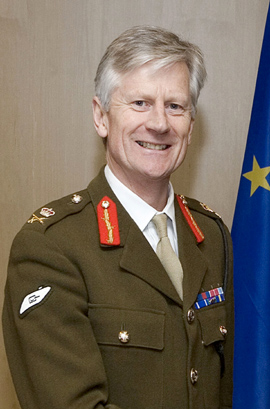
Lieutenant General Arundell David Leakey, is a former British Army officer. He was Director General of the European Union Military Staff in the Council of the European Union, Brussels. In 2010 he was appointed Gentleman Usher of the Black Rod, a role he held until February 2018.
Admiral of the Fleet Sir David Benjamin Bathurst, is a former Royal Navy officer. He is the only living person, apart from King Charles III, holding the rank of Admiral of the Fleet in the Royal Navy since the death of Lord Boyce. After training as a pilot and qualifying as a helicopter instructor, Bathurst commanded a Naval Air Squadron and then two frigates before achieving higher command in the navy. He served as First Sea Lord and Chief of the Naval Staff from 1993 to 1995: in that capacity he advised the British Government on the deployment of Naval Support including Sea Harriers during the Bosnian War.
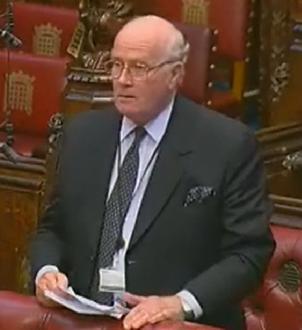
Field Marshal Richard Frederick Vincent, Baron Vincent of Coleshill, was a British Army officer. After serving with British Army of the Rhine he served with the Commonwealth Brigade in Malaysia during the Indonesia–Malaysia confrontation. He commanded 12th Light Air Defence Regiment in Northern Ireland during the Troubles, for which he was appointed a Companion of the Distinguished Service Order, and later commanded 19th Airportable Brigade. Although he never served as one of the individual service heads, he went on to be Vice-Chief of the Defence Staff in the late 1980s and then Chief of the Defence Staff in the aftermath of the Gulf War. He subsequently became Chair of the Military Committee of NATO in the mid-1990s.

General Sir William Godfrey Fothergill Jackson, was a British Army officer, military historian, author and Governor of Gibraltar.

General Sir Nicholas Ralph Parker, is a former British Army officer who served as Commander Land Forces until December 2012.
Lieutenant-General Sir Robert Francis Richardson was a British Army officer. Among other posts, he commanded a battalion and a brigade during the Troubles before becoming General Officer Commanding in Northern Ireland from 1982 to 1985.

General Sir Peter Anthony Wall, is a retired British Army officer who served as the Chief of the General Staff, the professional head of the British Army, until September 2014. Wall had previously been the Commander-in-Chief, Land Forces from August 2009 to September 2010. He succeeded General Sir David Richards as Chief of the General Staff in September 2010, the latter going on a month later to be Chief of the Defence Staff.

Lieutenant General Sir Hew William Royston Pike is a retired senior British Army officer known for his service in the Falklands War and for his command in Northern Ireland.

General Sir Charles Richard Huxtable, was a senior British Army officer who served as Commander-in-Chief, Land Forces from 1988 to 1990.
General Sir Jack Wentworth Harman, was a British Army officer who served as Adjutant-General to the Forces from 1976 to 1978. He began his military career in 1940, serving in The Queen's Bays for the majority of his early career and saw service with them during Second World War in the Middle East, Europe and Africa. Following the war Harman held various appointments at regimental, divisional and corps, level rising to fulfil the role of Adjutant-General to the Forces in 1976. His final position was as Deputy Supreme Allied Commander Europe, which he held until retirement in 1981. In later life he served as a director of an insurance brokers and vice-chairman of the National Army Museum and The Automobile Association before he died in 2009, at the age of 89.

General Sir Nicholas Patrick Carter, is a retired senior British Army officer who served as Chief of the Defence Staff from June 2018 to November 2021.

Lieutenant General Sir James Jeffrey Corfield Bucknall, is a retired British Army officer and former Commander of the Allied Rapid Reaction Corps.
Major General Andrew Robert Douglas Pringle, is a retired British Army officer who served as president of KBR's International Government and Defence business.
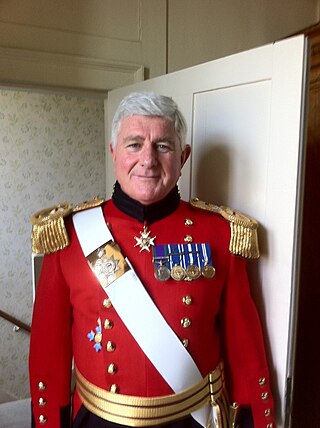
Lieutenant General Peter Thomas Clayton Pearson, is a former British Army officer who served as Commandant of the Royal Military Academy Sandhurst from 2006 to 2007.

General Sir Mark Alexander Popham Carleton-Smith, is a senior British Army officer who served as Chief of the General Staff from June 2018 to June 2022. He previously served as Director Special Forces and commanded 22 Special Air Service Regiment.













